Expert panel to discuss PFAS in firefighting gear with documentary film screening

On April 29 (Saturday), the University of Notre Dame will host a screening of “BURNED: Protecting the Protectors” — a short documentary exploring the link between perfluorinated substances, known as “forever chemicals,” and decades of cancer in the firefighting community. The screening will take place at the DeBartolo Performing Art Center’s Browning Cinema at 6:30 p.m.
Researchers in chemistry, engineering, physics and biological sciences honored by AAAS

Five faculty members at the University of Notre Dame have been elected by the American Association for the Advancement of Science (AAAS) as lifetime fellows. The fellows include Patricia A. Champion, Jon P. Camden, Yih-Fang Huang, Ahsan Kareem and Rebecca Surman. All are being recognized for scientifically and socially distinguished achievements in their respective fields of study.
Designing climate-resilient cities in at-risk communities

In September, the U.S. Department of Energy’s Argonne National Laboratory announced it would lead a multi-institutional…
Spatial repellents significantly reduce infections of mosquito-borne viruses, study finds
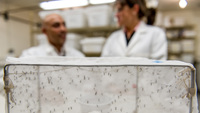
The Iquitos trial was part of a multi-year effort led by scientists at the University of Notre Dame to determine the protective efficacy of spatial repellents to prevent human infection with pathogens that cause diseases such as malaria, Zika and dengue, spread through mosquito bites.
Zika infections drastically underreported during 2015 epidemic
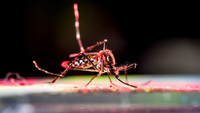
More than 100 million infections of Zika virus within Central and South America and the Caribbean went undetected between 2015 and 2018, according to a new study.
Face masks, reduced capacity critical when reopening K-12 schools in Indiana, according to new study
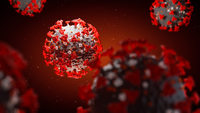
A new study by researchers at the University of Notre Dame cautions that K-12 schools reopening to full capacity with little to no compliance of safety measures such as face masks could drive infections up to an estimated 2.49 million in Indiana alone, with more than 9,000 deaths by the end of 2020.
Strong relationships in adulthood won’t ‘fix’ effects of early childhood adversity
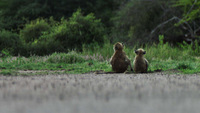
Harsh conditions in early life are a fundamental cause of adult stress, and according to new research from the University of Notre Dame on wild baboons, this effect is not explained by a lack of social support in adulthood.
New study takes closer look at how environment affects daily life of brown-throated three-toed sloth

Scientists studying brown-throated three-toed sloths, where predators are extinct and food is more accessible, have found that the animals adapt to have a primarily diurnal, or daytime, schedule.
Notre Dame researchers to study wastewater, focus on short-term forecasts in response to pandemic
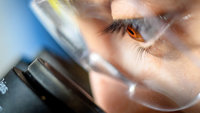
Alex Perkins and Kyle Bibby are looking at short-term forecasts of potential infection and are monitoring spread of the coronavirus in wastewater.
New research suggests US may be at critical juncture of pandemic response

A new study by epidemiologists at the University of Notre Dame suggests social distancing measures at current levels in many states may need to be maintained until the summer to avoid a potentially deadly resurgence of the coronavirus.
Why climate scientists are watching the world’s response to coronavirus

Climate scientists at Notre Dame say despite the challenge to collecting data, the current crisis is already spurring new proposals for research and revealing interesting parallels to the climate crisis that could provide valuable lessons for the future.
Strength in numbers: Crowdsourcing challenge seeks new methods to combat drug-resistant malaria
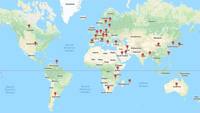
Three hundred and sixty participants from 31 countries participated in the Malaria DREAM Challenge, a crowdsourcing effort challenging anyone in the world to develop computational models for predicting emerging drug resistance to artemisinin, a widely used therapeutic considered the “last line of defense” against multi-drug-resistant malaria.
Biologist Mary Ann McDowell named Jefferson Science Fellow

The Jefferson Science Fellowship Program is designed to further build capacity for science, technology and engineering expertise with the U.S. Department of State and the U.S. Agency for International Development (USAID).
Study provides insight into spatial repellents as method to reduce infection of vector-borne diseases, encourages additional research
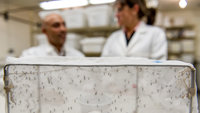
According to researchers at the University of Notre Dame, data from a clinical trial in Indonesia designed to evaluate the impact of a spatial repellent on reducing malaria infections showed promising results.
Jennifer Tank named Hoosier Resilience Hero
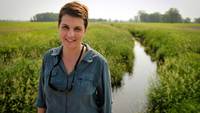
Tank, who also currently serves as the current president of the Society for Freshwater Science, is being recognized for her research that sits at the intersection of freshwater systems and agriculture in the Midwest.
Microglia, cells thought restricted to central nervous system, are redefined in new study

Inside the body, disease and injury can leave behind quite the mess — a scattering of cellular debris, like bits of broken glass, rubber and steel left behind in a car accident. Inside the central nervous system (CNS), a region that includes the brain and spinal cord, it is the job of certain cells, called microglia, to clean up that cellular debris. Microglia have counterparts called macrophages that serve similar function outside the CNS in the peripheral nervous system (PNS), the region that contains most of the sensory and motor nerves.
Notre Dame receives its largest research award to study spatial repellents against mosquito-borne diseases
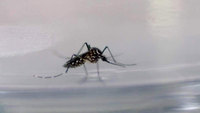
Notre Dame will lead a five-year program to determine the efficacy of a spatial repellent product in preventing mosquito-borne diseases such as malaria, dengue and Chikungunya.
Study: Tuberculosis survives by using host system against itself
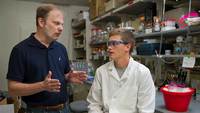
In a new study published in the Journal of Experimental Medicine, scientists at the University of Notre Dame have discovered that the pathogen Mycobacterium tuberculosis (MTB) releases RNA into infected cells.
Scientists neutralize reactive nitrogen molecules to enhance cancer immunotherapy

Immunotherapy — harnessing T-cells to attack cancer cells in the body — has given hope to patients who endure round after round of treatment, including chemotherapy, to little effect. For all of its promise, however, immunotherapy still benefits only a minority of patients — a reality driving research in the field for ways to improve the relatively new approach. One method for improving efficacy is the development of bio- and activity-based markers to better predict which patients will respond to immunotherapy and identify why some don’t. In a new study in the Proceedings of the National Academy of Sciences, researchers at the University of Notre Dame studying tumors in prostate cancer models found that nitration of an amino acid can inhibit T-cell activation, thwarting the T-cell’s ability to kill cancer cells.
As climate changes, so could the genes of the Eastern tiger swallowtail butterfly
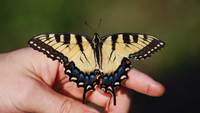
The reality of climate change poses a significant threat to global biodiversity. As temperatures rise, the survival of individual species will ultimately depend on their ability to adapt to changes in habitat and their interactions with other species. A new study published in the Proceedings of the National Academy of Sciences examines movement of the Eastern (Papilio glaucus) and Canadian (Papilio Canadensis) tiger swallowtail butterfly over a 32-year period within the geographic region where the two species mate, called the hybrid zone. The findings highlight the impact of changing climates and provide critical information for the protection and management of biodiversity.
New study finds mycobacteria can sense presence of proteins that cause disease

Tuberculosis-causing mycobacteria use a select group of proteins known as virulence factors to transmit the disease, which infects roughly one third of the world’s population and causes 1.7 million deaths annually. Those proteins are cargo transported by molecular machinery, a microscopic gateway that promotes the survival of bacteria in the host. A new study by researchers at the University of Notre Dame and Michigan State University, published in the Proceedings of the National Academy of Sciences, reveals that mycobacteria can sense when this molecular machine is present.
Researchers improve method to identify aquatic species using environmental DNA
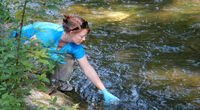
According to a new study, researchers have improved their method of tracking species by using the biological material those organisms leave behind known as environmental DNA (eDNA).
Researchers Use Light to Manipulate Mosquitoes
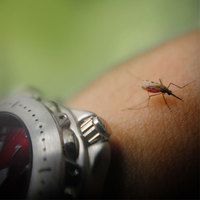
Scientists at the University of Notre Dame have found that exposure to just 10 minutes of light at night suppresses biting and manipulates flight behavior in the Anopheles gambiae mosquito, the major vector for transmission of malaria in Africa, according to new research published in the journal Parasites and Vectors.
Scientists Reveal New and Improved Genome Sequence of Daphnia Pulex
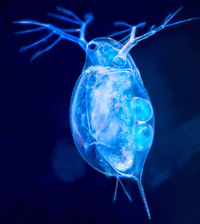
By understanding how they respond to toxic elements, scientists can look at how environmental changes caused by agriculture and road runoff or warming temperatures and climate change could impact populations in lakes, rivers and standing bodies of water.
Researchers develop predictive model measuring nitrous oxide emissions in streams and rivers
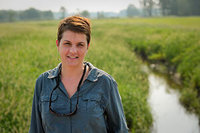
Jennifer Tank, Galla Professor in the Department of Biological Sciences co-authored new research published in the journal Proceedings of the National Academy of Sciences.
Tuberculosis: The Disease of Antiquity

Jeff Schorey, a world-renowned expert with pioneering work on the role of exosomes in infectious diseases, has been studying mycobacterial disease for almost two decades.
Zika: Where are we now?
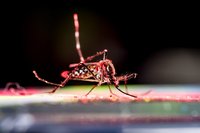
Professors in Notre Dame’s Department of Biological Sciences and members of the Eck Institute reflect on the outbreak, the challenges presented by the virus and the work yet to be done to help health professionals and key decision makers protect their citizens.